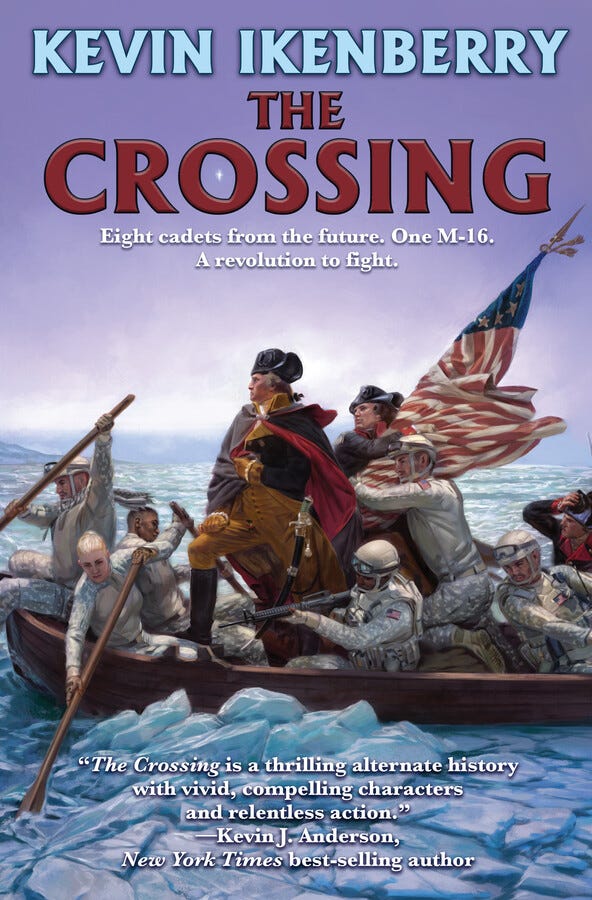In the spirit of Harry Turtledove’s THE GUNS OF THE SOUTH, Kevin Ikenberry decides to slap a little bit of time travel onto a big historical American war, introducing firepower that’s about 200 years ahead of its time. Unlike TGOTS, THE CROSSING is tight and concise and takes place in the wider sandbox of Eric Flint’s Assiti Shards universe.
The Story
If you’re unfamiliar with Assiti Shards, here’s the necessary bit: there are these random jolts of energy that fly across the cosmos from some alien civilization and crash into Earth. When they hit, pieces of land become temporally displaced, moving backward in time by centuries. The late Eric Flint started this universe with his novel 1632, which expanded into a massive series with numerous collaborators.
THE CROSSING is a Shards story featuring a squad of Army cadets in 2008 who suddenly find themselves catapulted backward to December 21st, 1776, in the northeastern United States. They immediately drop into a colonial farm under attack by Hessians, so it’s pretty easy to pick sides. They win the fight but one of the Hessians makes off with an M-16, and even though the cadets only had dummy rounds (they were on a training exercise when they got Sharded), it still represents a massive technological leap. If they don’t get the gun back, it’ll find its way into British hands and change the course of industrial history.
That’s just one problem. Once they figure out the date, they realize George Washington’s post-Christmas Delaware River attack is less than a week out, and they want to help. In fact, they might have to. This idea has a few speed bumps though, not least of which is that one of the cadets is a woman, and two of them are black. 18th Century America might have had Deborah Sampson and Crispus Attucks, but they were extreme exceptions.
The Characters
My absolute kryptonite when I read military fiction is that I become “name-blind” when reading about different soldiers who carry the same rank. This became a big problem for me with THE CROSSING because they’re all cadets. The two who stood out to me, though, were Mason and Booker, the black cadets who had to explain to the Continental Army why they were equal to their fellow soldiers in the future.
In the hands of a lesser author, this story element would have been handled poorly, but Ikenberry did a good job with it and didn’t soapbox about anachronistic race relations. The future soldiers explained their time to the army of the past, and once they all had a read on the situation—and they realized their shared goal of establishing America—they carried on with the story.
Even so, the soldiers weren’t cookie-cutter copies of each other. They quarreled and disagreed and had conflicting visions for how to proceed. There were also a few chapters written from George Washington’s perspective, and they felt authentic without feeling forced. Ikenberry handled his characters well here.
The World
The brief glimpses of 2008 USA are easily recognizable, while the 1776 portion of the novel was easy to understand. Some historical fiction spends a ton of time explaining setting, but Ikenberry kept a light hand here. There were only a few exposition scenes that stood out—again, the author keeps the story moving.
The Politics
None.
Content
R-rating for language (lotta F-bombs, it’s the Army) and an attempted rape (a Hessian is trying to force himself on a colonist when the cadets arrive in 1776, and they save her.)
Who’s it for?
Fans of historical fiction and military fiction. Other than the time-travel mechanism, sci-fi doesn’t play a huge role.
Why buy it?
THE CROSSING makes for a great Independence Day read, and in addition to be an entertaining narrative, the characters highlight facts about the Delaware Crossing that don’t get as much attention in history classes. This gives it value beyond a fun mil-fic story.





This sounds like an interesting read. I'll have to see if it's on kindle.
I got this book for Christmas. Great read, nominated it for a Dragon!